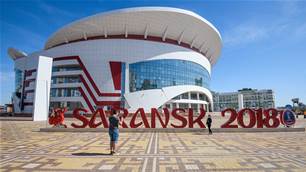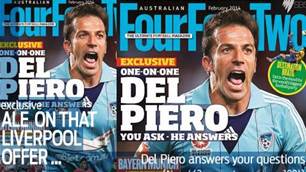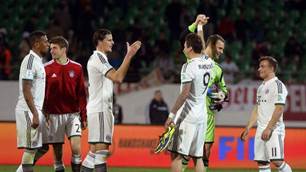International police forces will mount the biggest ever joint intelligence gathering operation for a sports event at this summer's World Cup, Interpol's security chief said today.
Following a two-day security workshop at FIFA headquarters in Zurich attended by representatives from 29 of the 32 participating teams, Interpol manager of operations Chris Eaton said no stone would be left unturned.
"Interpol will deploy its largest ever team of experts for any major event to South Africa," Eaton said.
"The preparation and planning by any security measure is exceptional."
Eaton was backed up by South Africa's national police commissioner Bheki Cele, who said 1.3billion rand was being spent on security and urged fans to have a party rather than a war.
"The security forces will be supporting players, participants, fans and everyone to enjoy the tournament as much as they can with the understanding that they are not there to fight a war," Cele said.
"We are not going to war from June 11 to July 11."
As for the 32 finalists, Cele said each team would receive unprecedented round-the-clock security in a country where the average murder rate is 50 a day.
"We will be working on a one-to-one basis with individual countries with specific plans for those teams," he added. "All possible means will be utilised to protect our players, teams and officials."
Until now, no-one connected with the World Cup had been prepared to link the finals with the terrorist attack on the Togo bus at the African Nations Cup, where three people were killed, leading to the country's withdrawal from the tournament.
But Cele said there was no doubt that the attack had forced a rethink over World Cup security.
Revealing that South African police officials visited Angola three weeks ago, Cele said: "There were lessons learned for South Africa.
"It helped and enhanced us and made us much better and brighter in terms of preparations."
Meanwhile, FIFA president Sepp Blatter urged the media not to keep questioning South Africa as World Cup host.
"It is the best country south of the Sahara to stage the tournament," Blatter said. "Why don't the media help us?
"Football in this continent is more than just kicking a football. It was my initiative but now the whole family agrees."
Andrew Holt, football head of the Association of Chief Police Officers (ACPO), revealed he would be deploying a dozen experts to help monitor the behaviour of English fans and prevent convicted hooligans from travelling.
"Our role is not to police the English fans per se but to assist our South African colleagues to interpret the behaviour and mood of the English fans," he said.
"They have different ways of celebrating and if you are not used to that, you might not know how to interpret it. We will also have British officers at all ports of entry."
"Interpol will deploy its largest ever team of experts for any major event to South Africa," Eaton said.
"The preparation and planning by any security measure is exceptional."
Eaton was backed up by South Africa's national police commissioner Bheki Cele, who said 1.3billion rand was being spent on security and urged fans to have a party rather than a war.
"The security forces will be supporting players, participants, fans and everyone to enjoy the tournament as much as they can with the understanding that they are not there to fight a war," Cele said.
"We are not going to war from June 11 to July 11."
As for the 32 finalists, Cele said each team would receive unprecedented round-the-clock security in a country where the average murder rate is 50 a day.
"We will be working on a one-to-one basis with individual countries with specific plans for those teams," he added. "All possible means will be utilised to protect our players, teams and officials."
Until now, no-one connected with the World Cup had been prepared to link the finals with the terrorist attack on the Togo bus at the African Nations Cup, where three people were killed, leading to the country's withdrawal from the tournament.
But Cele said there was no doubt that the attack had forced a rethink over World Cup security.
Revealing that South African police officials visited Angola three weeks ago, Cele said: "There were lessons learned for South Africa.
"It helped and enhanced us and made us much better and brighter in terms of preparations."
Meanwhile, FIFA president Sepp Blatter urged the media not to keep questioning South Africa as World Cup host.
"It is the best country south of the Sahara to stage the tournament," Blatter said. "Why don't the media help us?
"Football in this continent is more than just kicking a football. It was my initiative but now the whole family agrees."
Andrew Holt, football head of the Association of Chief Police Officers (ACPO), revealed he would be deploying a dozen experts to help monitor the behaviour of English fans and prevent convicted hooligans from travelling.
"Our role is not to police the English fans per se but to assist our South African colleagues to interpret the behaviour and mood of the English fans," he said.
"They have different ways of celebrating and if you are not used to that, you might not know how to interpret it. We will also have British officers at all ports of entry."
Copyright (c) Press Association
Related Articles

Iceland frustrate Messi’s fourth world cup campaign

Del Piero on that Liverpool offer













